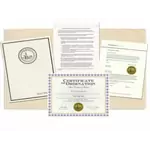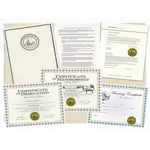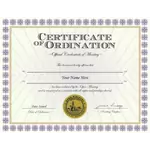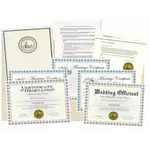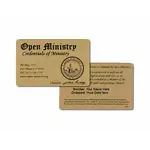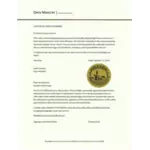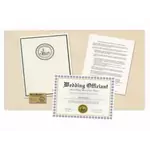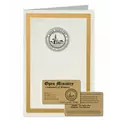State Marriage Laws and Information
Since 2010, Open Ministry has been ordaining and helping people all over the world perform weddings, ceremony and other sacerdotal duties. This page focuses on requirements and information for Nevada; Scroll down to the bottom of the page for links to other states.
How to get ordained and perform a wedding in Nevada
If you are planning to get ordained in Nevada or you have been asked to perform a wedding ceremony in Nevada, or simply need to to find an ordained minister in Nevada to perform your wedding ceremony.
This ordination information forNevada is provided below in an easy five step layout which is designed help walk you through the most common steps on registering to become a minister for Nevada and how perform a wedding ceremony in Nevada.
Step 1 - Get Ordained Online for free with Open Ministry
Step 1: Get Ordained in Nevada with Open Ministry
Getting ordained in Nevada has never been simpler or more affordable. Open Ministry provides a fast, free ordination you complete entirely online-often in under 12 hours-with digital confirmation delivered free and printed certificates for a modest lifetime fee.
When you get ordained in Nevada through Open Ministry, you’ll enjoy:
- Complete online in minutes - no paperwork required.
- Free emailed ordination - get it almost instantly.
- Printed certificate options - check out the store for info.
- Approved credentials - valid in every Nevada county.
- Established network - thousands of ordained ministers since 2010.
How It Works
- Select the Get Ordained in Nevada button.
- Enter your information in our secure portal.
- Get your digital ordination and optionally order printed certificates.
As a recognized ordained minister in Nevada, you’ll have the legal right to solemnize marriages and lead ceremonies across the state.
Secure Your Nevada Ordination Now
Free digital ordination-printed certificates available for a small fee.
Step 2 - Contact The County Clerk
How to Register to Officiate a Marriage in Nevada
Next, contact the office of your local marriage authority (typically your county clerk in Nevada). Let them know that you are a ordained minister with Open Ministry in California, and ask them what information the will require of you, to officiate a marriage in Nevada. Most clerks and governing agencies may require that you present them with a physical copy of your ordination record.
When speaking with the county clerk; it can be helpful to use the following phrases.
- What agency or department issues marriage licenses in your county and how may I contact them?
- I am an ordained minister with a church in California and I would like to register as a wedding Officiant in your county to perform and solemnize weddings.
- I have my Letter of Good Standing and/or Ordination Credential as proof of my ministry and ordination.
- What additional documentation is required for me to register as a wedding Officiant in your county or state?
Step 3 - Get registered to perform a Marriage
License to perform a wedding in Nevada
After you've contacted your marriage authority, you will want to visit our bookstore to get physical copies official credentials for presentation and your records. (See Nevada State Statutes for More Specific Requirements )
When registering in Nevada you may be asked to display proof of your ordination to the county clerk's before they will accept the marriage license as having been legally solemnized. We typically advise ministers of Nevada to get a Complete Minister Package for Nevada which includes your Letter of Good Standing (the live signed and notarized physical copy of your standing with our ministry).
Having your physical copies credentials provides peace-of-mind to couples and others that you intend to marry. Additionally, we recommend at least 4 weeks between the date of the wedding ceremony and your order, to ensure that you receive all of your materials and are able to register in time. Please note that every state and county can impose different requirements. This may include other nominal fees and additional paperwork that may need to be completed before the ceremony can take place.
It is important to note that some county clerks in Nevada may require wedding officiants to attach a statement which asserts some of the elements in the marriage license upon submission, including the following:
- The time and location at which the wedding took place
- The names and places of residence of all official witnesses
- The religious organization in which the officiant is ordained
- The printed name and address of the officiant
Please note that, when filling out a marriage license, that Nevada State may request you use the title "Minister" or "Reverend". The County Clerks may also require you enter your denomination, you can use "Non-Denominational". Failing to state a denomination may result in rejection and could require a duplicate marriage license.
Step 4 - How to Perform the Wedding
How to perform a wedding in Nevada
Once you have completed of the above, you are ready to perform the wedding! Be sure that the couple has picked up their Nevada state issued marriage license from the appropriate office. Nevada marriage licenses valid for a set number of days, and there may be a waiting period between when the couple receives the marriage license in Nevada and when the ceremony may be legally performed in Nevada. This information should be written on the license and followed to ensure the ceremony is recorded properly.
Please be aware that the signed license must be returned to the issuing office in Nevada before the time limit is reached. Check the marriage license for the exact dates. Once the the previous matters have been addressed, officiating a wedding in Nevada can be a great and wonderful experience.
If you have any comments or issues as a wedding officiant in Nevada, or after you have been ordained, or would like to just asking for guidance on how to perform a wedding ceremony in Nevada. We recommend that all new Nevada wedding ministers who have issues or concerns about the ceremony read over our helpful guides.
Nevada
If you plan to perform a wedding in Douglas, Elko, Washoe county, you may be required to present the Affidavit of Authority to Solemnize Marriages.
Clark County (Las Vegas) requires that you to complete their online application prior to performing any ceremony. See our blog about registering with Clark County
122.062 Licensed, ordained or appointed ministers, other persons authorized to solemnize a marriage and chaplains of Armed Forces to obtain certificates from county clerk; temporary replacements; solemnization by minister or other authorized person who resides in
- Any licensed, ordained or appointed minister or other person authorized to solemnize a marriage in good standing within his or her church or religious organization, or either of them, incorporated, organized or established in this State, may join together as husband and wife persons who present a marriage license obtained from any county clerk of the State, if the minister or other person authorized to solemnize a marriage first obtains a certificate of permission to perform marriages as provided in NRS 122.062 to 122.073, inclusive. The fact that a minister or other person authorized to solemnize a marriage is retired does not disqualify him or her from obtaining a certificate of permission to perform marriages if, before retirement, the minister or other person authorized to solemnize a marriage had active charge of a church or religious organization for a period of at least 3 years.
- A temporary replacement for a licensed, ordained or appointed minister or other person authorized to solemnize a marriage certified pursuant to NRS 122.062 to 122.073, inclusive, may solemnize marriages pursuant to subsection 1 during such time as he or she may be authorized to do so by the county clerk in the county in which he or she is a temporary replacement, for a period not to exceed 90 days. The minister or other person authorized to solemnize a marriage whom he or she temporarily replaces shall provide him or her with a written authorization which states the period during which it is effective.
- Any chaplain who is assigned to duty in this State by the Armed Forces of the United States may solemnize marriages if the chaplain obtains a certificate of permission to perform marriages from the county clerk of the county in which his or her duty station is located. The county clerk shall issue such a certificate to a chaplain upon proof of his or her military status as a chaplain and of his or her assignment.
- A county clerk may authorize a licensed, ordained or appointed minister or other person authorized to solemnize a marriage whose residence and church or religious organization is in another state or who is retired, if his or her service was as described in subsection 1, to perform marriages in the county if the county clerk is satisfied that the minister or other person authorized to solemnize a marriage is in good standing with his or her church or religious organization pursuant to this section. The authorization must be in writing and need not be filed with any other public officer. A separate authorization is required for each marriage performed. Such a minister or other person authorized to solemnize a marriage may perform not more than five marriages in this State in any calendar year and must acknowledge that he or she is subject to the jurisdiction of the county clerk with respect to the provisions of this chapter governing the conduct of ministers or other persons authorized to solemnize a marriage to the same extent as if he or she were a minister or other person authorized to solemnize a marriage residing in this State.
Title 11: Domestic Relations - Chapter 122: Marriage - Certificates of Permission to Perform Marriages (Added to NRS by 1967, 1289; A 1969, 37; 1993, 1462; 1997, 2040; 1999, 520, 541; 2009, 724)
122.066 Database of ministers or other persons authorized to solemnize a marriage; maintenance of database by Secretary of State; entry of certain information into database by county clerk; approval of application for certificate; validity of certificate; revocation
- The Secretary of State shall establish and maintain a statewide database of ministers or other persons authorized to solemnize a marriage. The database must:
- Serve as the official list of ministers or other persons authorized to solemnize a marriage approved in this State;
- Provide for a single method of storing and managing the official list;
- Be a uniform, centralized and interactive database;
- Be electronically secure and accessible to each county clerk in this State;
- Contain the name, mailing address and other pertinent information of each minister or other person authorized to solemnize a marriage as prescribed by the Secretary of State; and
- Include a unique identifier assigned by the Secretary of State to each minister or other person authorized to solemnize a marriage.
- If the county clerk approves an application for a certificate of permission to perform marriages, the county clerk shall:
- Enter all information contained in the application into the electronic statewide database of ministers or other persons authorized to solemnize a marriage maintained by the Secretary of State not later than 10 days after the certificate of permission to perform marriages is approved by the county clerk; and
- Provide to the Secretary of State all information related to the minister or other person authorized to solemnize a marriage pursuant to paragraph (e) of subsection 1.
- Upon approval of an application pursuant to subsection 2, the minister or other person authorized to solemnize a marriage:
- Shall comply with the laws of this State governing the solemnization of marriage and conduct of ministers or other persons authorized to solemnize a marriage;
- Is subject to further review or investigation by the county clerk to ensure that he or she continues to meet the statutory requirements for a person authorized to solemnize a marriage; and
- Shall provide the county clerk with any changes to his or her status or information, including, without limitation, the address or telephone number of the church or religious organization or any other information pertaining to certification.
- A certificate of permission is valid until the county clerk has received an affidavit of revocation of authority to solemnize marriages pursuant to NRS 122.0665.
- An affidavit of revocation of authority to solemnize marriages that is received pursuant to subsection 4 must be sent to the county clerk within 5 days after the minister or other person authorized to solemnize a marriage ceased to be a member of the church or religious organization in good standing or ceased to be a minister or other person authorized to solemnize a marriage for the church or religious organization.
- If the county clerk in the county where the certificate of permission was issued has reason to believe that the minister or other person authorized to solemnize a marriage is no longer in good standing within his or her church or religious organization, or that he or she is no longer a minister or other person authorized to solemnize a marriage, or that such church or religious organization no longer exists, the county clerk may require satisfactory proof of the good standing of the minister or other person authorized to solemnize a marriage. If such proof is not presented within 15 days, the county clerk shall revoke the certificate of permission by amending the electronic record of the minister or other person authorized to solemnize a marriage in the statewide database pursuant to subsection 1.
- If any minister or other person authorized to solemnize a marriage to whom a certificate of permission has been issued severs ties with his or her church or religious organization or moves from the county in which his or her certificate was issued, the certificate shall expire immediately upon such severance or move, and the church or religious organization shall, within 5 days after the severance or move, file an affidavit of revocation of authority to solemnize marriages pursuant to NRS 122.0665. If the minister or other person authorized to solemnize a marriage voluntarily advises the county clerk of the county in which his or her certificate was issued of his or her severance with his or her church or religious organization, or that he or she has moved from the county, the certificate shall expire immediately upon such severance or move without any notification to the county clerk by the church or religious organization.
- The Secretary of State may adopt regulations concerning the creation and administration of the statewide database. This section does not prohibit the Secretary of State from making the database publicly accessible for the purpose of viewing ministers or other persons who are authorized to solemnize a marriage in this State.
Title 11: Domestic Relations - Chapter 122: Marriage - Authentication of Marriage - Certificates of Permission to Perform Marriages (Added to NRS by 1967, 1290; A 1969, 92; 1971, 1550; 2009, 728)

